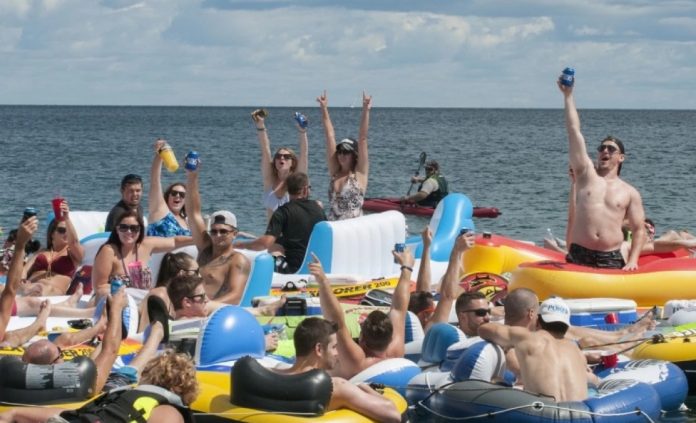
TORONTO – Illegally entering Canada and being rescued by the coast guard was not what the swimsuit-clad Americans who were swept into foreign waters on Sunday had in mind when they set off from Port Huron, Michigan.
But that’s what happened to Ann Levere, who has spent many summer days in an inflatable raft on the St. Clair River bordering Michigan and the Canadian province of Ontario. The annual Port Huron Float Down, which draws cooler-toting revelers in colorful dinghies and inner tubes, is a tradition dating to the late ’70s, and Levere has been a regular for nearly as long.
This year strong winds blew Levere eastward, separating her from her family. In an attempt to point her raft in the other direction, the 48-year-old grandmother slipped and fell into Canadian waters.
She wasn’t alone – some 1,500 river partygoers inadvertently drifted across the northern border, entering Canada without documentation on Sunday. Most had to be rescued through a massive effort from several Canadian agencies, then were returned to the United States by bus.
Others were given a lift back to the American side by friendly Canadians on the water.
After Levere tumbled into the river, a Canadian woman pulled her up onto her own raft. Together, they latched onto a Canadian freighter that towed them toward Port Huron. By the time Levere reached land, she had been on the water for nearly seven hours.
“They just made me feel so warm and comfortable,” she said of her rescuers in a phone interview with The Washington Post. “If it wasn’t for them, I don’t know what would have happened to me.”
Other floaters were just as grateful for the neighborly assistance.
“God bless Canada!” a raucous group shouted in a Canadian Coast Guard video posted by the CBC.
A statement from the Coast Guard described the Port Huron Float Down as an “unsanctioned event” that “poses significant and unusual hazards given the fast-moving current, large number of participants, lack of life jackets … [and] challenging weather conditions.”
Speaking to the CBC, Coast Guard official Peter Garapick said he wishes the event would end but knows that’s “wishful thinking.”
Some Americans who feared retribution from Canadian authorities tried to swim back to the Port Huron shore.
“They were terrified of entering another country without documentation,” Garapick said. “No one carries their passport or any ID, and a lot were drinking alcohol. We had to pull a lot of people out of the water and say ‘no.’ They were very upset, cold and miserable.”
A line of buses transported the floaters, who were described as “possibly drunk” and “refugees” in Canadian media, over a bridge and back onto American soil.
Sunday’s festivities weren’t the first time Americans caused trouble in Canada this summer. In June, a big game hunter from Ohio posted a YouTube video showing himself killing an Alberta black bear with a spear, along with a photo of the bear’s intestines wrapped around a tree branch.
After the video went viral this month, the government of Alberta said they plan to ban spear hunting, calling the practice “archaic” and “unacceptable,” while commenters labeled it “barbaric.”
In 2012, a LivingSocial survey of Canadians found that 39 percent believe Americans are the world’s worst tourists. It may be due to what they bring with them: On Monday, the Canadian Border Services Agency issued a statement urging Americans tourist to leave their firearms at home.
In Sarnia, city workers on Monday were still cleaning up beer cans, coolers and flotation devices left behind by their unexpected Float Down guests.
“This [year’s Port Huron Float Down] was the worst but also the best,” said Levere, who noted that “there’s always a few drunk people who fight and make it seem bad for the rest of us.”
She concluded: “It was scary at first, crazy – but fun.”
Picture: AP/Handout
—
(c) 2016, The Washington Post · Yanan Wang

